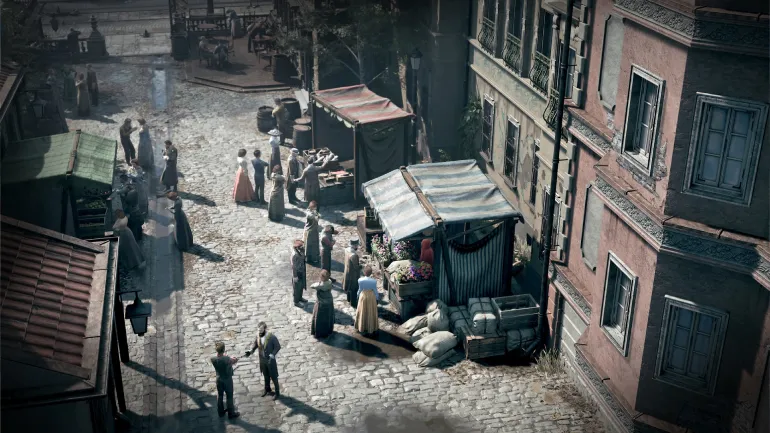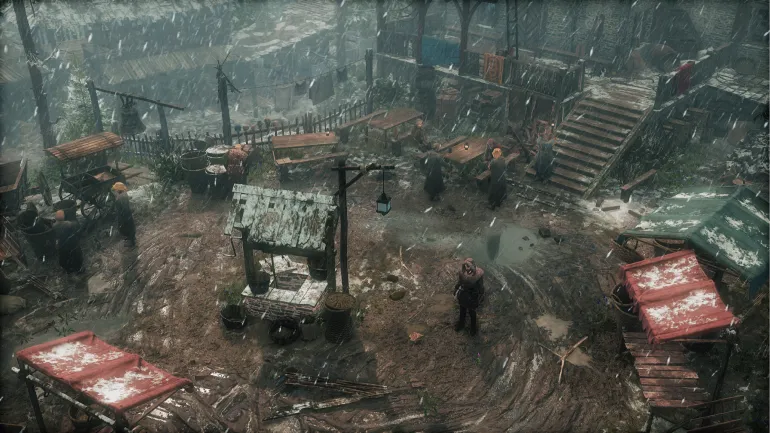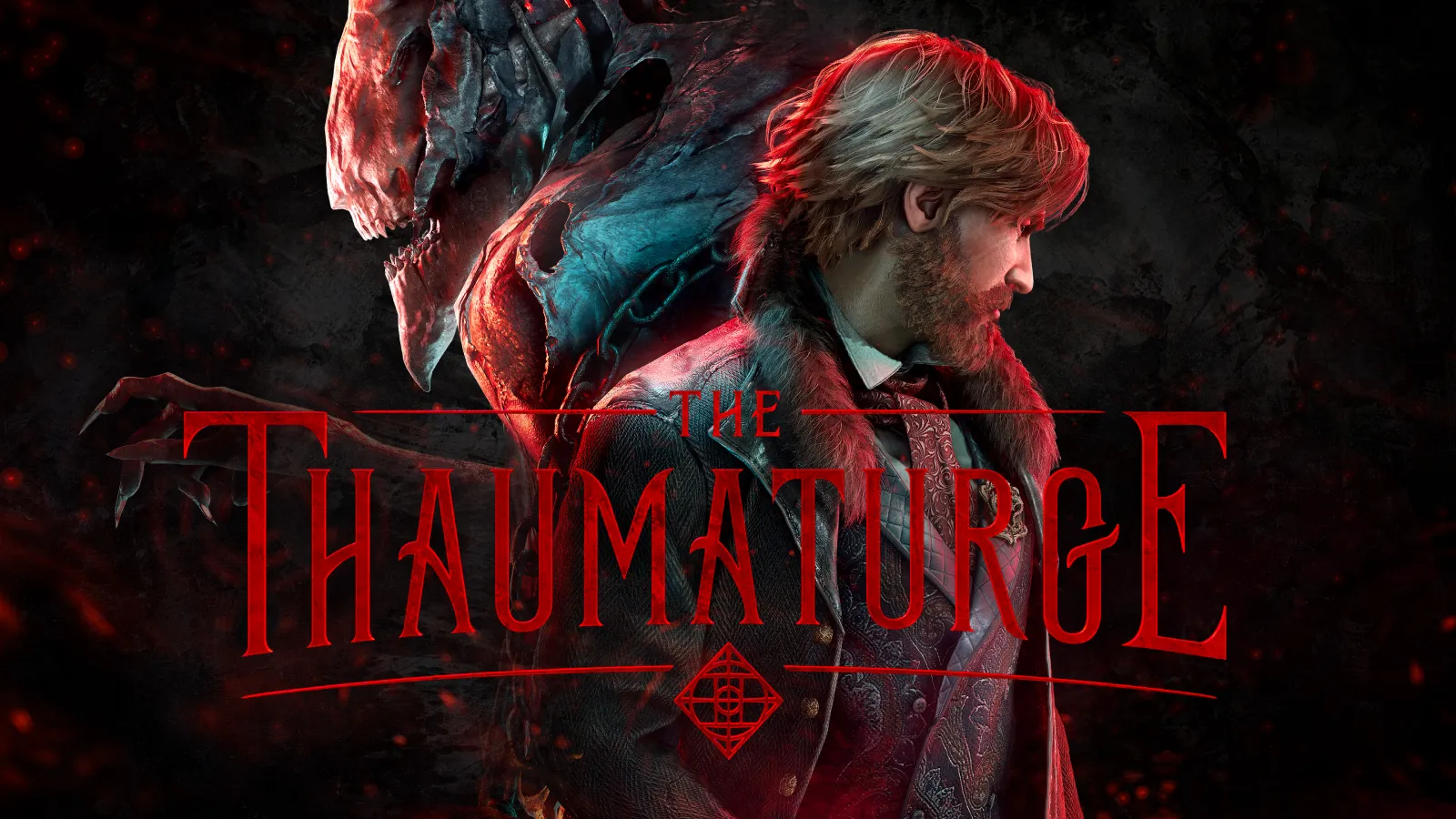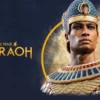The Thaumaturge stands out as a rare gem in the world of gaming, with its unique setting in turn-of-the-century Warsaw. This historical dark fantasy RPG from Polish studio Fool’s Theory showcases the bold design decisions and ambitious intentions that were also evident in their previous release, Seven. The game delves into Polish history and Western political progress, offering players a meaty and detailed exploration of a world rarely seen in gaming. The concept behind The Thaumaturge is intriguing and promises to deliver an experience that goes beyond the typical fantasy RPG, making it a must-play for gamers looking for something different.
11 Bit Studios, a Polish-based game developer, has taken on the publishing duties for The Thaumaturge, showcasing their commitment to pushing the boundaries of experimental game development in their nation. Known for their innovative releases such as the Anomaly series, This War of Mine, and Frostpunk, 11 Bit Studios has a reputation for creating deep and captivating gaming experiences. The Thaumaturge's unique design and setting align perfectly with the studio's ethos, blending unconventional gameplay mechanics with a familiar genre. As a choice-driven, turn-based RPG, The Thaumaturge promises to offer players a fresh and engaging experience unlike anything they've seen before.
The Thaumaturge is a game that struggles to maintain narrative coherence and mechanical consistency throughout the lengthy playthrough. With a heavy focus on clicking and exploration, players may find themselves feeling lost and unsure of their purpose. While there are moments of player agency, many of the mechanics are cryptic and confusing, leading to a sense of frustration. The dialogue-driven story paths often feel disjointed and disconnected, leaving players feeling as though they are wandering aimlessly through the game world. Despite its potential, The Thaumaturge fails to create a cohesive and engaging experience for players.
Exploring Historical Warsaw
As Wiktor Szulski walks the cobblestone streets of Warsaw in 1905, he can't help but feel the weight of his father's legacy on his shoulders. His father, a renowned thaumaturge, had always been emotionally distant, leaving Wiktor to fend for himself in mastering the craft. Now, as he embarks on a journey to hone his talents in solitude, he knows that he must return to his bustling hometown for a funeral that will test his abilities like never before. With determination in his heart and a sense of duty driving him forward, Wiktor sets out to prove himself as a worthy successor to his father's legacy.
The role of a Thaumaturge is not for the faint of heart, as it involves delving into the dark depths of the human psyche to combat malevolent beings known as salutors. These creatures thrive on negative emotions such as pride and envy, using their hosts to carry out malicious deeds. Thaumaturges, however, possess the unique ability to absorb and control these flaws, enabling them to effectively thwart the salutors' sinister plans. It is a dangerous and isolating occupation, but one that is essential in protecting the world from the influence of these malevolent entities.
The concept of combining elements of Persona and Pokémon with spiritualism, psychiatry, and pop psychology in a video game is truly unique and intriguing. Wiktor's pride, which is his own flaw, is represented by his loyal salutor Upyr, a skeletal senior apparition who acts as his trusted companion throughout his journey. Upyr may not speak, but his presence provides essential support for Wiktor during his solitary adventures. The bond between Wiktor and Upyr is reminiscent of the relationship between a trainer and their Pokémon, especially during the intense turn-based combat sequences in the game. This oddball idea adds a new dimension to the gaming experience, making it both thought-provoking and entertaining.
Capturing Horrific Slavic Creatures
In a pivotal combat encounter in The Thaumaturge, Wiktor successfully captures the elusive saltuor Veles, a feat that propels the game's storyline forward. The intense battle between Wiktor and Veles is filled with strategic maneuvers and powerful spells, showcasing Wiktor's formidable skills as a thaumaturge. As Veles is finally subdued and added to Wiktor's collection, players are left in awe of the captivating narrative and immersive gameplay experience. While the Persona/Pokémon aspect of the game may not be as prominent as initially anticipated, the thrill of capturing Veles adds an exciting element to the overall gameplay.
While salutors may have the power to influence conversations and actions in specific circumstances, delving too deeply into their role risks undermining the concept of personal responsibility for violent actions. Are those under the influence of a salutor truly absolved of their crimes, while others who act out of lust or envy are not? The idea that these select few are victims of demonic control raises questions about the legitimacy of their actions and the implications for others who commit similar crimes. It is important to consider the complexities of human behavior and the consequences of attributing violent actions solely to external influences.

The Thaumaturge presents a captivating yet flawed narrative that struggles to reconcile its contradictions and issues. The salutors, intricately designed creatures inspired by Slavic folklore, add an eerie and haunting element to the story. However, mechanical and script-related problems hinder the overall experience, making it difficult to fully immerse oneself in the world of The Thaumaturge. Despite these challenges, the creative riffs on folklore and the striking design of the salutors cannot be denied, offering a glimpse into a dark and twisted world reminiscent of an adults-only horror game.
Questing for Meaningful Payoffs
Despite the vast and immersive world of The Thaumaturge, one missed opportunity lies in the lack of direct invocation of salutors during exploration. As players navigate the different districts of Warsaw, each offering unique environments and activities, there is a noticeable absence of salutors influencing gameplay. While the bustling city comes to life with various events and interactions throughout the day, the potential for salutors to play a more prominent role in shaping the player's experience remains untapped. This oversight detracts from the overall depth and immersion of the game, leaving a void in the connection between the player and the mystical forces at play in The Thaumaturge's world.
As players progress from an early-game village to a bustling city in the midst of political unrest, they are met with a lively and chaotic atmosphere. The streets are filled with a constant buzz of activity – people chatting, laughing, and indulging in various activities. However, the city areas may feel a bit limited in terms of interaction, with only a few hotspots to click on and engage with. Despite this, players can still immerse themselves in the city's ambiance by exploring various one-off items and events scattered throughout, from stereoscopic photograph booths to food vendors. The city may be filled with distractions, but underneath it all lies a rich and intricate world waiting to be uncovered.
The discovery of note scraps detailing an underground bare-knuckle boxing circuit initially sparks excitement for Wiktor. As he tracks down more key items, the time and location of the event are automatically revealed. However, the pursuit ultimately leads to a disappointingly meager payoff, with only a sketched image and a silent film-like title card describing his evening. Despite the initial thrill, Wiktor is left feeling unsatisfied as he continues his journey on the streets.
While there are some genuinely engaging interactive encounters in The Thaumaturge, it is disheartening to see the abundance of mute stand-in NPCs and trivial side quests scattered throughout the game. These elements detract from the overall immersion and can feel like unnecessary filler content. If these side quests cannot be seamlessly integrated into the main story, it would be more beneficial to either remove them entirely or separate them from the main gameplay to reduce the feeling of constant busywork.
Interacting with the Game World
As a thaumaturge, Wiktor possesses the unique ability of “perception,” allowing him to see a magical red route to his next objective and highlight special items in his surroundings with a simple right-click of the mouse. Through this ability, he can sense the energy left behind on relics by others, whether it be a note written in jealousy or a cup of tea left for a sick loved one. By reading these items, Wiktor can connect them into “conclusions” that he uses to his advantage in specific instances of dialogue, ultimately leading to more favorable outcomes. His keen perception and ability to interpret the energy of objects set him apart as a skilled and powerful thaumaturge.
The rise of games that give the illusion of problem-solving agency while leading players to default conclusions is a concerning trend in the gaming industry. Titles like Alan Wake 2 and Deathloop are prime examples of this phenomenon, where players may feel like they are making choices, but ultimately end up following a pre-determined path. The Thaumaturge, despite its intriguing setting and potential for experimentation, falls into this same trap, reducing its mysteries to a simple formula of clicking on everything until the truth is revealed by the main character. As players, we should be wary of games that limit our true agency and critical thinking skills in favor of superficial choices and outcomes.
While The Thaumaturge does offer players multiple dialogue options that can potentially change the course of the game, the primary point-and-click gameplay leaves much to be desired. The game is filled with confusing mechanical elements that can hinder the player's progress. For example, if a player's stats are not high enough to “read” an item in a room, they may miss out on important information or conversation options. This can be frustrating for players, as it limits their ability to fully explore and interact with the game world.
This dilemma can lead to a frustrating experience for players in a game. The inability to control the direction of a character they have become emotionally invested in can be disheartening, especially when they are enjoying the storyline. On the other hand, for those who are not fully engaged in the plot, they may accidentally stumble upon hidden gems of dialogue or storylines that they were not even aware of due to quickly skipping past certain details. This lack of control over the narrative can create a disconnect between the player and the game, ultimately detracting from the overall gaming experience.
The Thaumaturge's inconsistent writing is evident in its item descriptions and dialogue. While some text, like newspaper stories and personal letters, are well-written, the dialogue in the game varies in quality. For instance, Wiktor’s friend Abaurycy, a gay gang leader, seems to be a mix of characters from other franchises, resulting in awkward and tonally incorrect phrases. It's unclear whether the voice actor, casting director, or writers are most responsible for the character's sloppy delivery. This inconsistency in writing detracts from the overall experience of the game.
From the very beginning of the game, The Thaumaturge struggles to capture the true essence of its characters, resulting in awkward and often unintentionally humorous interactions. The dialogue feels clunky and forced, with a lack of authenticity that leaves players feeling disconnected from the story. While the game's developer Fool's Theory is based in Poland, the decision to only include English dialogue may have been a misstep, as a Polish language dub could have added a level of realism and depth to the game. The inconsistencies in tone and behavior throughout the game ultimately detract from the overall experience, leaving players longing for a more cohesive and immersive narrative.


Despite its flaws, The Thaumaturge's plot manages to captivate with its compelling narrative, leading players to overlook some questionable performances and inconsistencies in the script. While it's clear that certain plot arcs were left unfinished, the story still delivers enjoyable events and unexpected twists that keep players engaged. One particularly memorable moment sees Wiktor engaging in a tense battle of wits during a secret séance, surrounded by the elegance of a formal dinner party. The diverse cast of characters, including cunning Kabbalists and cruel Cossack soldiers, adds depth and richness to the game's historical setting, making it a truly immersive experience despite its shortcomings.
Verdict
The turn-based combat in The Thaumaturge is a notable aspect of the game that, unfortunately, falls short of expectations. While not terrible, it lacks coherence and is dismissively easy, with minimal impact on the overall gameplay experience. Rarely encountering a game over screen diminishes the sense of challenge, and the inconsistent presence of combat feels like a last-minute addition rather than an integral part of the game. Despite the ability to adjust difficulty settings, the combat in The Thaumaturge is ultimately underwhelming and fails to provide the mechanical depth that one would hope for.
The insecurity in the game's design is evident in the reliance on random clicking and lack of player agency. There seems to be a fear that the setting and adventure game elements alone would not be enough to engage players. However, the game could have been much more compelling as a purely conversation-driven RPG, with a focus on meaningful choices and branching paths. A stronger script could have elevated the experience even further, creating a more immersive and engaging game overall.
The Thaumaturge stands out as a unique and special game in the world of Slavic fantasy adventures. The game allows players to interact with historical figures like Rasputin and explore intriguing golem developments alongside beset Rabbis. Despite a few shortcomings in the script, the overall content is compelling and draws players in with its immersive setting. Those who are captivated by this world will undoubtedly be eager to dive into The Thaumaturge, as it showcases the vast potential for exploration and storytelling that video games have yet to fully tap into.






